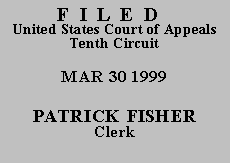

|
MOSES AUGUSTUS, |
|
Before TACHA, McKAY, and MURPHY, Circuit Judges.
Moses Augustus, proceeding pro se, appeals the district court's dismissal of his Bivens-type civil rights complaint(1) on the ground the complaint was filed outside of the applicable two-year limitations period. In his complaint, Augustus alleged that he was beaten by the defendant prison guard at 10:20 a.m. on December 14, 1995. The district court began its analysis by noting that the applicable limitations period was the two-year period set out in Kan. Stat. Ann. § 60-513(a)(4) and that Augustus had not filed his complaint until July 21, 1998. Because Augustus filed his claim approximately thirty-one months after the alleged beating, rather than within the two-years set out in the statute, the district court concluded that the claim was barred.
Rather than addressing the statute-of-limitations question in his appellate brief, Augustus has, instead, simply changed the date of the alleged incident. Without any explanation, Augustus asserts in his appellate brief that the alleged beating incident took place on December 14, 1998, rather than December 14, 1995. This change in date is particularly startling in light of two facts. First, Augustus repeatedly and unequivocally alleged in his complaint that the purported beating took place in 1995. Second, and more important, Augustus' complaint was filed in July of 1998, approximately five months before the newly fabricated date of the incident. In light of these facts, it is clear that Augustus' appeal is both frivolous and malicious. Accordingly, this court DISMISSES this appeal pursuant to 28 U.S.C. § 1915(e)(2). Thus, this appeal counts as a "prior occasion" for purposes of the three-strikes provision set out in 28 U.S.C. § 1915(g). Finally, this court reminds Augustus of his continuing obligation to pay all installments of the deferred appellate filing fee until it is paid in full. No exception is made for dismissed appeals. See 28 U.S.C. § 1915(b)(2).
ENTERED FOR THE COURT:
Michael R. Murphy
Circuit Judge
*. This order and judgment is not binding precedent, except under the doctrines of law of the case, res judicata and collateral estoppel. The court generally disfavors the citation of orders and judgments; nevertheless, an order and judgment may be cited under the terms and conditions of 10th Cir. R. 36.3.
1.See Bivens v. Six Unknown Named Agents, 403 U.S. 388 (1971).